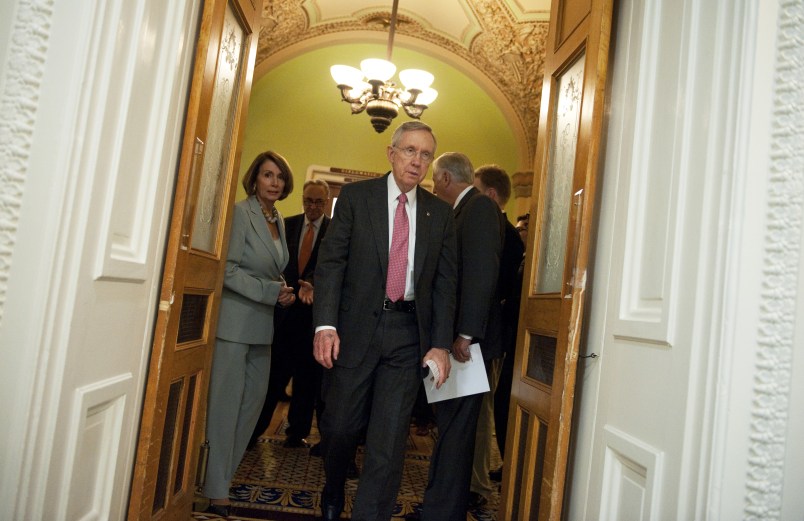Josh Barro, Matt Yglesias and others have teed up this post to bat around various theories explaining why Democrats seem so much more concerned with getting Republicans to vote for higher tax revenues than with simply achieving higher revenues by doing nothing — allowing the Bush tax cuts to expire and then fixing tax code retroactively.
In one sense I think the question’s easy to answer. But I also think it’s a surface manifestation of a deeper fight between the parties, and that the real answer’s about much, much more than near-term politics.
Let’s start with the former. The simple reality is that Republicans have agency here. They control the House. They’re in the midst of yet another push to extend all the Bush tax cuts for a year. Dems can’t just ignore this and hope voters intuit what’s really going on, when the choice will appear to be between the party that wants to stop an across-the-board tax increase, and the party that wants to let the across-the-board tax increase happen. On top of that, there’s an obvious political logic to getting even modest Republican buy-in, and ideally to squeezing marginal Republicans whose constituents like the idea of rich people paying more taxes.
For all those reasons, it makes a lot of sense for Democrats to counter squeeze Republicans with things like the Buffett Rule between now and Dec. 31. Then, if Republicans haven’t decided to play ball on their own (and, crucially, if Obama’s won a second term), they can introduce a tax-cut package that’ll raise revenue compared to what the government’s taking in now, yet will still constitute a tax cut relative to allowing all the Bush tax cuts to expire forever.
But I think there’s something deeper going on here, too, and that you can glean most it from the public record. For years and years now, the Democrats have been a much more fiscally responsible party than the Republicans. (Here, fiscally responsible means that they try to pay for the federal programs they support, not fiscally responsible in the way Republicans define it, where social spending programs are “fiscally irresponsible” even if they’re paid for.)
Republicans, by contrast, have intentionally drawn up big deficits with massive tax cuts, so that popular programs they don’t really like will eventually have to be cut. This is more or less the central organizing principle of the conservative movement, and the main way the conservative movement exerts control over the GOP. It’s no coincidence that when Republicans came back to power in 2011, they made deficits a huge legislative priority, and insisted on reducing them by cutting social programs alone.
The Democrats’ counter-strategy is a bit more subtle, but has essentially been to find ways to make it very uncomfortable for Republicans to maintain such a rigid anti-tax orthodoxy — to ultimately force Republicans to break their anti-tax pledges and badly splinter their party. That’s what the Buffett Rule is about; that why Dems insist they won’t dismantle the so-called “sequester” — big cuts to defense and even to Medicare — unless Republicans agree to tackle deficits in a balanced way, i.e. by supporting significant new tax revenues.
The results have been mixed. They’ve won a small number of GOP votes here and there, and vulnerable members are nowadays more likely to trash or dismiss Grover Norquist in the press than they were last year. But at a very high level within the Democratic Party, there’s a recognition that breaking the GOP on taxes is an absolutely crucial strategic imperative for defending safety net programs over the long term. Getting the revenue in a passive way is a second best option, because it lets Republicans off the hook substantively, and would allow them to resuscitate the starve-the-beast policymaking that’s underlay their strategy for at least the last two decades. If they aren’t forced to grapple with the political pitfalls of that strategy and disown it, we’ll be right back where we started the next time the GOP controls government.
In the day to day of legislative politics, it’s not always apparent that either party believes there’s more at stake than simply appeasing interest groups. But if you ask party leaders directly, they’re pretty open about their broader visions. It’s also one of the reasons Democrats have for months resisted fierce GOP efforts to roll back scheduled cuts to defense programs, and have insisted that the sequester stand until Republicans treat their tax allergy. That’s a huge political gamble for Dems, but to cave would be to relinquish a key source of leverage.
That’s not to say Republicans will yield, and the White House knows it. “Several White House officials I talked to made it clear that if a deal, or at least the framework for a deal, is not reached before December 31st Obama would allow all the Bush tax cuts to expire–a tactic that would achieve huge deficit reduction, but in a particularly painful and ill-conceived fashion,” Ryan Lizza reported in the New Yorker this week. They’ve told me and many other reporters the same, even though the politics of saying so somewhat publicly are pretty dangerous for Democrats. And it’s evidence, I think, that they see defeating the anti-taxers as a profound imperative. Shocking, I know, but Democrats are genuinely taking a longer view here.






